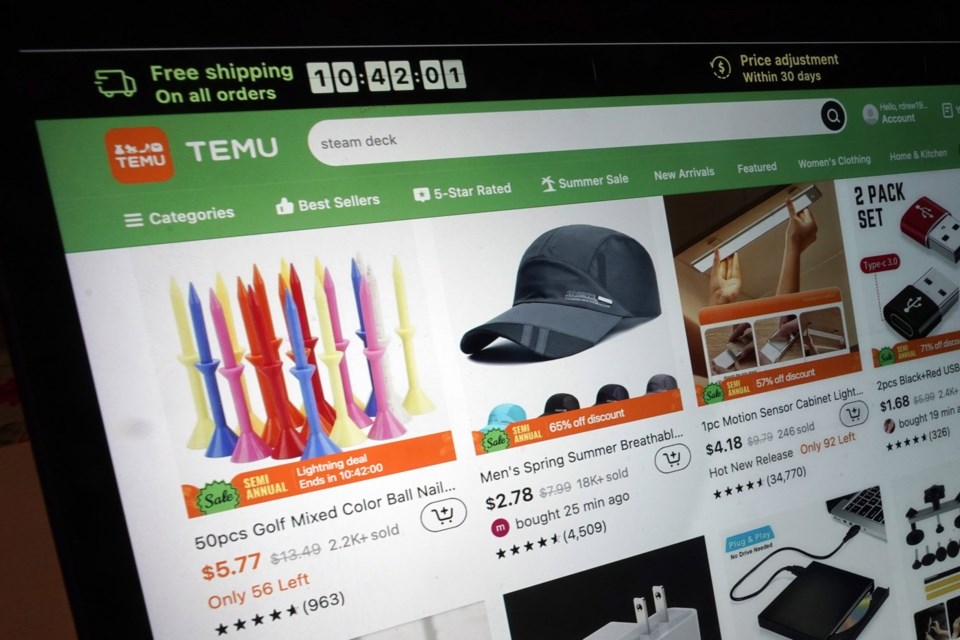Online marketplace Temu is moving deeper into Shopify Inc.'s home turf with a program that allows Canadian businesses to sell goods through the e-commerce platform to customers in the country.
Temu, which originated in China but now spans 90 markets, said Monday it marks the first time Canadian businesses will be able to list their products directly on its site and app.
Temu positioned the initiative as a way to expand its product base while speeding up the fulfilment of orders. It said the program will only support businesses registered in Canada with local inventory and fulfilment capabilities.
The move, however, positions Temu more squarely in the home territory of Shopify, an Ottawa-based giant known for selling technology that global businesses use to power their e-commerce offerings. Kraft Heinz, Nestlé, Crayola and Gymshark are among the millions of Shopify customers.
Because Temu is a marketplace akin to Amazon, some may not see it as a direct competitor to Shopify, but with both offering sales avenues for small businesses, experts say Temu's strengthened push into Canada is bound to boost e-commerce competition.
"It certainly has implications for Shopify, for Amazon, for all of the players in this space," said Jenna Jacobson, an associate professor at Toronto Metropolitan University focused on retail.
Those implications will be playing out as Canadian shoppers are aiming to support more local brands to help the economy as U.S. President Donald Trump threatens to impose tariffs on Canadian goods.
Joanne McNeish, an associate professor at Toronto Metropolitan University specializing in marketing, expects the buy Canadian sentiment to factor into how many companies take advantage of Temu's new program.
"I would rather see Canadian companies supporting Shopify, which is also a global online platform, than Temu," she reasoned in an email.
Shopify did not immediately respond for a request for comment on the competition unfolding with Temu, which along with e-commerce business Pinduoduo is owned by PDD Holdings
Temu has yet to reveal what terms it will offer Canadian businesses or fees it will charge them. The Canadian Press sent a detailed list of questions to Temu about the Canadian launch, competition with Shopify and concerns about Temu's platform, but was no one was available to respond to them on Monday.
Though Jacobo saw Temu's approach to helping local businesses sell to local customers as "really innovative," she warned "the devil is going to be in the details."
Many platforms start off by waiving or discounting fees to attract clients before weaning users off the incentives, she said.
Yet some companies will see the fees as worth it because Temu will put their products in front of a large audience without the businesses having to promote themselves much.
"You don't need to get somebody to go to your business or to your website to purchase your product and have a whole e-commerce site that is set up," she said.
Shoppers on the platform aren't always that discerning either, she pointed out.
"If you're purchasing on Temu, for many people, it doesn't really matter who is selling the product," she said noting people will often visit the company for bargain prices on generic items like birthday decorations.
"You're not going to find luxury sellers that are going to sign up for this. You're not going to have companies that are trying to stress their sustainable practices. This is not going to be a fit with their business."
McNeish agrees.
When Temu launched in the U.S. in 2022 and began allowing Canadians to make purchases through its marketplace in February 2023, she noticed the quality of goods on the platform was poor. Many products also came from third parties, rather than the original manufacturer.
"For a Canadian company to link itself to a brand with a questionable reputation is never a good idea," McNeish said.
"I would also imagine that the cost of doing business with Temu is unlikely to result in long term profits for the Canadian partner."
Jacobson thinks companies using other platforms are unlikely to abandon them for Temu.
Instead, they'll likely see the marketplace as one more place to make a buck, she said.
"But there's a lot of competition," she said.
"For business owners, it will be all about figuring out what the right fit is."
This report by The Canadian Press was first published Feb. 24, 2025.
Tara Deschamps, The Canadian Press


